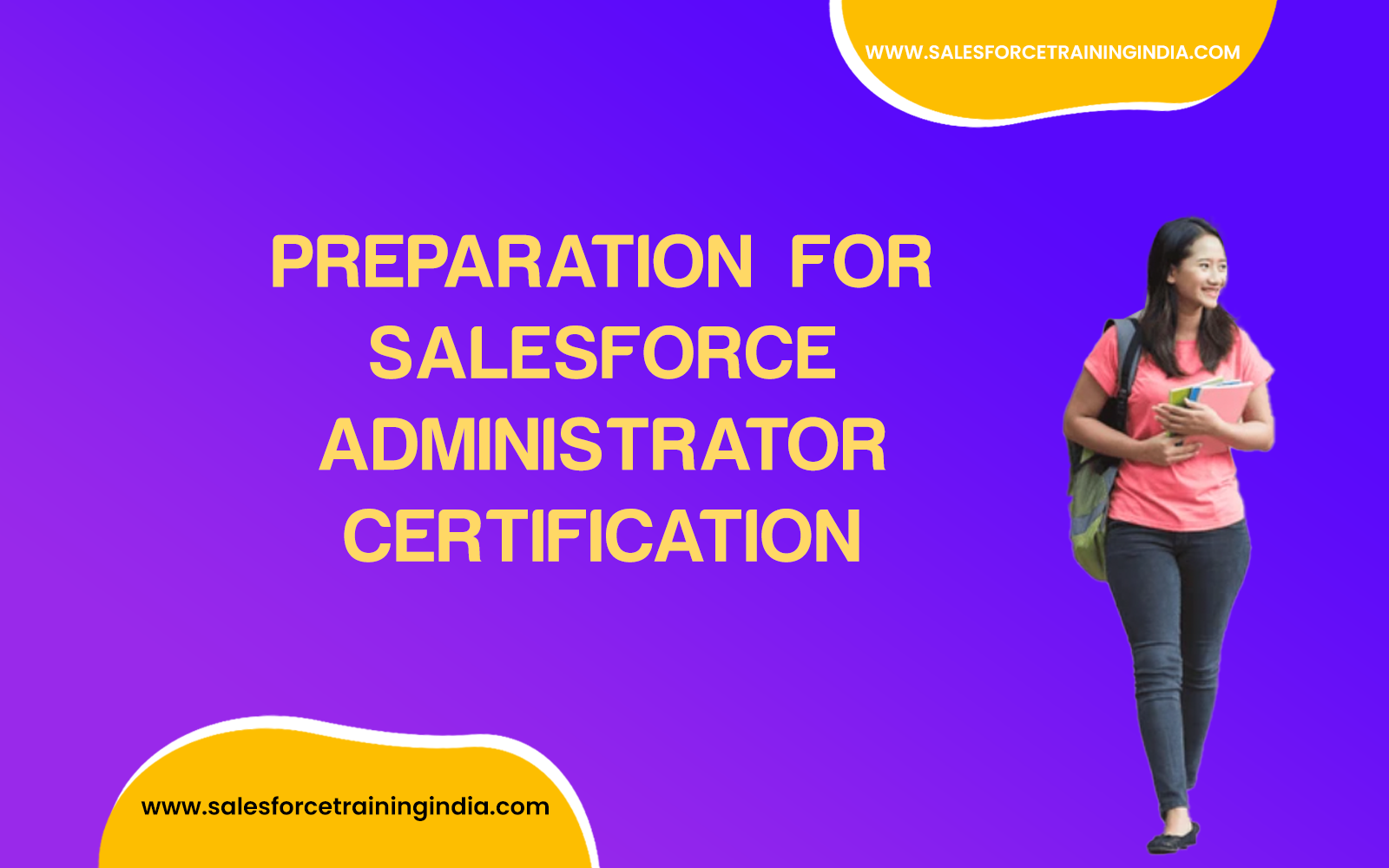Preparing for the Salesforce Administrator Certification is like training for a marathon. It requires dedication, a structured study plan, and a deep understanding of Salesforce functionalities. The Salesforce Administrator Certification is a professional credential that demonstrates your expertise in Salesforce. It’s valuable for those looking to establish or advance their career in Salesforce administration.
Understanding the Certification:
What It Covers:
The Salesforce Admin Certification is designed to validate the knowledge and skills of individuals responsible for managing Salesforce environments. The certification covers a broad range of topics that ensure candidates are proficient in customizing Salesforce to meet their organization’s needs, managing data, and supporting users. Here’s an overview of what the certification covers:
1. Organization Setup
- Understanding the company settings, including fiscal years, business hours, and currencies.
- Setting up and configuring user interface options.
2. User Setup
- Managing user accounts, including creating and managing users, setting up user profiles, and assigning permissions.
- Understanding and configuring roles and role hierarchies.
3. Security and Access
- Configuring and managing security settings, such as profiles, permission sets, and sharing settings.
- Implementing field-level security and data security measures.
- Understanding and configuring organization-wide defaults, sharing rules, and manual sharing.
4. Standard and Custom Objects
- Managing standard objects like Accounts, Contacts, Opportunities, and Leads.
- Creating and managing custom objects to store unique data specific to the organization’s needs.
- Configuring fields, relationships, and page layouts for standard and custom objects.
5. Sales and Marketing Applications
- Configuring and managing the sales process, including lead management, opportunity stages, and sales productivity features.
- Understanding and implementing marketing features such as campaigns and lead scoring.
6. Service and Support Applications
- Configuring and managing service processes, including case management, case assignment rules, and escalation rules.
- Implementing support features like knowledge management, live chat, and service entitlements.
7. Activity Management and Collaboration
- Managing activities, including tasks, events, and calendars.
- Understanding and configuring collaboration tools like Chatter and Salesforce Communities.
8. Data Management
- Importing, updating, and transferring data using tools like Data Loader and Data Import Wizard.
- Implementing data quality measures, including validation rules and duplicate management.
- Understanding and performing data backup and restore operations.
9. Analytics—Reports and Dashboards
- Creating and managing reports to analyze data and support decision-making.
- Designing and configuring dashboards to provide visual insights into key performance indicators.
- Understanding the different types of reports and dashboards and when to use them.
10. Workflow/Process Automation
- Configuring and managing workflow rules, process builder, and approval processes to automate business processes.
- Understanding and implementing flow to handle complex automation scenarios.
11. Desktop and Mobile Administration
- Configuring Salesforce for mobile use, including setting up Salesforce Mobile App and customizing mobile navigation.
- Managing desktop client settings and configurations.
12. AppExchange
- Understanding and utilizing the AppExchange to find and install third-party applications and components to extend Salesforce functionality.
Why Salesforce Certification is Important:
Salesforce certification is highly valued in the industry for several reasons. It not only validates your expertise and knowledge of the Salesforce platform but also provides numerous professional and organizational benefits. Here’s why obtaining a Salesforce certification is important:
1. Industry Recognition and Credibility
Obtaining a Salesforce certification demonstrates your commitment to excellence and expertise in the Salesforce ecosystem. It provides industry recognition and credibility as it shows that you have met the rigorous standards set by Salesforce. This certification is a testament to your skills and knowledge, making you stand out among your peers and giving you an edge in the job market.
2. Career Advancement
Salesforce certifications can significantly boost your career prospects. Certified professionals are often preferred by employers because they have validated skills and knowledge. This can lead to higher salaries, promotions, and greater job opportunities. Certification also opens doors to specialized roles, such as Salesforce Administrator, Developer, Consultant, or Architect, enabling you to advance your career in specific areas of interest.
3. Increased Earning Potential
Certified Salesforce professionals typically command higher salaries compared to their non-certified counterparts. The demand for skilled Salesforce experts is high, and organizations are willing to pay a premium for certified individuals who can effectively manage and optimize their Salesforce environments. This increased earning potential makes certification a worthwhile investment in your professional development.
4. Enhanced Skills and Knowledge
The process of obtaining a Salesforce certification involves comprehensive training and rigorous examination. This ensures that you gain a deep understanding of the Salesforce platform, including best practices, advanced features, and latest updates. This knowledge empowers you to perform your job more effectively and confidently, driving better results for your organization.
5. Professional Networking
Becoming Salesforce certified connects you to a global community of Salesforce professionals. This network provides opportunities for collaboration, knowledge sharing, and professional growth. Participation in Salesforce events, user groups, and online communities can help you stay updated with the latest trends, technologies, and best practices in the Salesforce ecosystem.
6. Organizational Benefits
For organizations, having certified Salesforce professionals ensures that their Salesforce implementation is in capable hands. Certified professionals bring expertise that can optimize business processes, improve data quality, and enhance overall system performance. This leads to better user adoption, increased productivity, and higher return on investment (ROI) for the Salesforce platform.
7. Staying Current with Technology
Salesforce regularly updates its platform with new features and functionalities. Certification requires ongoing learning and recertification, ensuring that you stay current with the latest advancements. This continuous learning helps you maintain your expertise and adapt to the ever-evolving Salesforce landscape, keeping you relevant and competitive in the industry.
Study Resources:
Salesforce Trailhead: This is an online learning platform provided by Salesforce, offering interactive modules, projects, and superbadges to help you prepare.
Official Study Guide:
Salesforce provides a study guide that outlines the exam’s content, structure, and weightage of different topics.
Online Courses and Webinars:
There are numerous online courses and webinars available, both free and paid, which can help you prepare for the exam. Join our hands-on real-time project based Salesforce online course, enroll for free demo today!
Exam Topics and Weightage:
The exam covers a range of topics like configuration, data management, security, workflow automation, and more. Each topic has a different weightage in the exam, so it’s crucial to know where to focus your study efforts.
here is the Salesforce Admin Exam Topics and Weightage in a table format:
| Topic | Weightage |
|---|---|
| Organization Setup | 3% |
| User Setup | 6% |
| Security and Access | 13% |
| Standard and Custom Objects | 14% |
| Sales and Marketing Applications | 14% |
| Service and Support Applications | 13% |
| Activity Management and Collaboration | 3% |
| Data Management | 10% |
| Analytics—Reports and Dashboards | 10% |
| Workflow/Process Automation | 16% |
| Desktop and Mobile Administration | 1% |
| AppExchange | 2% |
This table outlines the key areas covered in the Salesforce Admin Certification exam and the weight each topic holds in the overall assessment.
Hands-On Practice:
Practical Experience: Practical, hands-on experience with Salesforce is crucial. Use a Developer Edition account of Salesforce to practice configuring the platform.
Trailhead Projects: Completing projects on Trailhead can provide valuable hands-on experience.
10 Points for Study Plan:
Detailed Study Plan Example:
| Week | Topics | Resources |
|---|---|---|
| Week 1 | Organization Setup, User Setup | Trailhead modules, Salesforce documentation |
| Week 2 | Security and Access | Trailhead, Salesforce documentation, practice scenarios |
| Week 3 | Standard and Custom Objects | Trailhead, hands-on practice |
| Week 4 | Sales and Marketing Applications | Trailhead, Salesforce Admin Study Guide |
| Week 5 | Service and Support Applications | Trailhead, practice cases |
| Week 6 | Data Management, Activity Management | Trailhead, hands-on practice, community discussions |
| Week 7 | Analytics—Reports and Dashboards | Trailhead, practice building reports and dashboards |
| Week 8 | Workflow/Process Automation | Trailhead, hands-on practice with Flow Builder |
| Week 9 | Desktop and Mobile Administration, AppExchange | Trailhead, Salesforce documentation |
| Week 10 | Review, Practice Exams, Focus on Weak Areas | Practice exams, community discussions, revision |
This study plan ensures you cover all exam topics comprehensively while providing ample time for hands-on practice and revision. By following this structured approach, you can enhance your chances of passing the Salesforce Admin Certification exam successfully.
Exam Day Preparation:
Understand the exam’s format, rules, and time limits. Ensure you are well-rested and arrive early at the test center or have a quiet space ready for an online exam.
In summary, preparing for the Salesforce Administrator Certification requires a combination of theoretical study and practical experience. Utilizing resources like Trailhead, participating in study groups, and consistently practicing within the Salesforce environment are key strategies for success. The certification not only validates your skills but also enhances your professional standing in the Salesforce community.
Frequently Asked Questions
1. Which Salesforce admin certification is best?
The Salesforce Certified Administrator certification is widely regarded as the best for aspiring Salesforce admins. This certification validates your skills and knowledge in managing and configuring Salesforce environments, making it the most recognized and fundamental certification in the Salesforce ecosystem. It covers essential topics such as user management, security and access, standard and custom objects, sales and service applications, and workflow automation. By earning this certification, you demonstrate your ability to effectively handle the administrative functions of Salesforce, which is highly valued by employers.
2. Is Salesforce Certified Administrator exam hard?
The Salesforce Certified Administrator exam can be challenging, especially for those new to the platform. The exam tests a wide range of topics and requires a deep understanding of Salesforce’s functionality and best practices. However, with thorough preparation, including studying Salesforce documentation, completing Trailhead modules, and practicing with mock exams, many candidates find it manageable. The key to success is consistent study and hands-on practice to fully grasp the concepts and tasks an administrator needs to perform.
3. How many hours does it take to get a Salesforce admin certification?
The time required to prepare for the Salesforce admin certification varies depending on your background and familiarity with Salesforce. On average, it takes around 80-100 hours of study and hands-on practice to prepare adequately for the exam. This includes going through Trailhead modules, reading Salesforce documentation, and practicing in a Salesforce Developer Edition account. Some individuals may need more or less time based on their experience level and learning pace.
4. How much does Salesforce admin certification cost?
The Salesforce admin certification cost is $200 per attempt. If you do not pass the exam on the first try, you can retake it for a reduced fee of $100 per retake. It’s important to consider the potential need for additional study materials or courses, which can add to the overall cost of certification preparation. However, investing in this certification can lead to significant career advancement and salary increases, making it a worthwhile expense.
5. How many times can you fail the Salesforce admin exam?
You can retake the Salesforce admin exam multiple times if you do not pass on your initial attempt. Salesforce allows you to retake the exam up to three times within a release cycle, which typically lasts for four months. After the third unsuccessful attempt within a release cycle, you must wait for the next release cycle to try again. This policy ensures that candidates have ample opportunities to pass the exam while encouraging thorough preparation.
6. How many people pass the Salesforce admin exam for the first time?
The exact percentage of candidates who pass the Salesforce admin exam on their first attempt is not publicly disclosed by Salesforce. However, anecdotal evidence and community feedback suggest that a significant portion of candidates pass the exam on their first try with adequate preparation. Utilizing resources like Trailhead, practice exams, and study guides can significantly improve your chances of passing on the first attempt. Consistent study and hands-on practice are key to success.
7. Which Salesforce job pays the most?
Among Salesforce roles, Salesforce Architects typically command the highest salaries. Salesforce Technical Architects and Solution Architects are highly specialized roles that require extensive knowledge of the Salesforce platform and the ability to design complex, scalable solutions. These positions often involve overseeing large implementations, integrating Salesforce with other systems, and ensuring best practices are followed. Due to the high level of expertise required, these roles offer salaries that can exceed $150,000 per year and even higher in some regions or companies.
8. Does Salesforce admin require coding?
Salesforce Admin roles generally do not require coding. The primary responsibilities of an admin involve managing user access, configuring Salesforce settings, creating reports and dashboards, and automating processes using declarative tools like Process Builder and Flow Builder. While understanding basic coding concepts can be beneficial, especially when collaborating with developers, it is not a core requirement for the role. Salesforce admins primarily use point-and-click tools to customize and manage the platform.
9. Is Salesforce Admin certification enough to get a job?
The Salesforce Admin certification is a strong credential that can significantly enhance your job prospects. While it demonstrates your knowledge and capability to manage Salesforce, getting a job may also depend on additional factors such as prior experience, understanding of business processes, and soft skills like communication and problem-solving. Many employers value practical experience, so gaining hands-on practice through internships, volunteer projects, or personal projects can complement your certification and make you a more competitive candidate.
10. Is Salesforce admin a good career?
Yes, a career as a Salesforce Admin is highly rewarding and offers numerous opportunities for growth. Salesforce is a leading CRM platform with a large market share, and the demand for skilled admins is consistently high. As a Salesforce Admin, you play a crucial role in helping organizations leverage the platform to improve their operations, sales, and customer service. The role offers competitive salaries, job security, and the potential for career advancement into more specialized positions like Salesforce Consultant or Architect. Additionally, the continuous evolution of Salesforce technology provides ongoing learning and development opportunities.
11. How hard is it to get an entry level Salesforce admin job?
Getting an entry-level Salesforce Admin job can be challenging but achievable with the right preparation. Employers often look for candidates with a combination of certification, practical experience, and an understanding of business processes. While the certification demonstrates your knowledge, gaining hands-on experience through internships, volunteer work, or personal projects can make you stand out. Networking within the Salesforce community, attending Salesforce events, and participating in online forums can also open doors to job opportunities. Persistence and dedication to learning the platform are key to securing an entry-level position.
12. What is the failure rate for Salesforce Admin certification?
The exact failure rate for the Salesforce Admin certification is not publicly disclosed by Salesforce. However, it is known that the exam is challenging and requires thorough preparation. Candidates who utilize comprehensive study resources, such as Trailhead, practice exams, and Salesforce documentation, generally have a higher success rate. While the failure rate may be significant for those who underestimate the exam’s difficulty, proper preparation and hands-on practice can greatly improve your chances of passing.
13. Can I get a Salesforce job with no experience?
Yes, it is possible to get a Salesforce job with no prior experience, particularly at the entry level. Obtaining a Salesforce certification, such as the Salesforce Admin certification, can significantly enhance your job prospects. Additionally, gaining hands-on experience through Trailhead, volunteering, or working on personal projects can make you a more attractive candidate. Networking within the Salesforce community, attending events, and leveraging platforms like LinkedIn can also help you find job opportunities. While challenging, it is feasible with the right approach and dedication.
14. Are Salesforce admins in demand?
Yes, Salesforce admins are in high demand. As more organizations adopt Salesforce to manage their customer relationships and business processes, the need for skilled admins who can configure and maintain the platform grows. Salesforce admins play a crucial role in ensuring that the platform is used effectively to meet business objectives, making them essential for successful Salesforce implementations. The continuous evolution of the Salesforce ecosystem also means that skilled admins are needed to keep up with new features and updates, further driving demand.
15. Can you be a Salesforce admin without certification?
While it is possible to be a Salesforce admin without certification, having the Salesforce Admin certification significantly enhances your credibility and job prospects. Certification demonstrates your knowledge and skills to potential employers, giving you a competitive edge. Without certification, you would need to rely more heavily on proving your experience and practical skills through work history, project involvement, and possibly extensive references. Certification provides a standardized validation of your capabilities, making it easier to establish your qualifications.
16. What is the cost of Salesforce admin certification?
The cost of the Salesforce Admin certification exam is $200. If you do not pass the exam on your first attempt, you can retake it for a reduced fee of $100 per retake. Investing in the certification can lead to significant career benefits, including higher salaries and better job opportunities, making it a worthwhile expense for those looking to advance their careers in Salesforce administration.
17. In what order should you get Salesforce certifications?
The order in which you should get Salesforce certifications typically depends on your career goals and current experience level. For most individuals, it is recommended to start with the Salesforce Certified Administrator certification, as it provides a solid foundation in Salesforce. After that, you can pursue the Salesforce Certified Advanced Administrator to deepen your administrative skills. If you are interested in development, the Salesforce Platform App Builder and Salesforce Developer certifications are logical next steps. For those aiming for specialized roles, certifications like Salesforce Sales Cloud Consultant, Service Cloud Consultant, or Marketing Cloud Consultant can be pursued. Ultimately, the best order is the one that aligns with your career objectives and the specific demands of your desired role.
18. What are the hardest Salesforce certifications?
Some of the hardest Salesforce certifications include the Salesforce Certified Technical Architect (CTA), Salesforce Certified Advanced Administrator, and Salesforce Certified Marketing Cloud Consultant. The CTA certification is particularly challenging due to its comprehensive coverage of the entire Salesforce platform and the requirement to present and defend a complex architectural solution in front of a review board. The Advanced Administrator certification is challenging due to its in-depth focus on advanced administrative functions, complex business processes, and extensive use cases. The Marketing Cloud Consultant certification requires a deep understanding of marketing automation, data management, and Salesforce’s marketing cloud products, making it one of the more specialized and demanding certifications.
Seize the opportunity to enhance your career prospects with our Salesforce training in India. Enroll today and benefit from personalized mentorship from seasoned instructors. Our specialized training includes a comprehensive, project-based curriculum that imparts real-time knowledge and practical skills.
With a focus on daily notes, hands-on projects, and thorough preparation for certification and interviews, our program ensures you’re fully equipped to excel in the competitive Salesforce ecosystem. Take the next step towards achieving your career goals by enrolling in our Salesforce online course with us.



